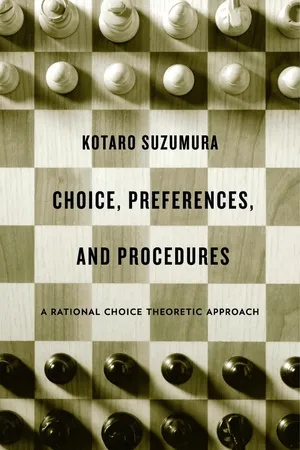
- English
- ePUB (mobile friendly)
- Available on iOS & Android
About This Book
Kotaro Suzumura is one of the world's foremost thinkers in social choice theory and welfare economics. Bringing together essays that have become classics in the field, Choice, Preferences, and Procedures examines foundational issues of normative economics and collective decision making.Social choice theory seeks to critically assess and rationally design economic mechanisms for improving human life. An important part of Suzumura's contribution over the past forty years has entailed fusion of abstract microeconomic ideas with an understanding of real-world economies in a coherent analysis. This volume of selected essays reveals the evolution of Suzumura's thinking over his career. Groundbreaking papers explore the nature of individual and social choice and the idea of assigning value to freedom of choice, different forms of rationality, and concepts of individual rights, equity, and fairness.Suzumura elucidates his innovative approach for recognizing interpersonal comparisons in the vein of Adam Smith's notion of sympathy and expounds the effect of paying due attention to nonconsequential features, such as the opportunity to choose and the procedure for decision making, along with the standard consequential features. Analyzing the role of economic competition, Suzumura points out how restricting competition may, in some circumstances, improve social welfare. This is not to recommend government regulation rather than market competition but to emphasize the importance of procedural features in a competitive context. He concludes with illuminating essays on the history of economic thought, focusing on the ideas of Vilfredo Pareto, Arthur Pigou, John Hicks, and Paul Samuelson.
Frequently asked questions
Information
PART I
RATIONAL CHOICE AS RATIONALIZABLE CHOICE
Introduction to Part I
Man is a gaming animal. He must be always trying to get the better in something or other.—CHARLES LAMB, “Mrs. Battle’s Opinions on Whist,” Essays of Elia, 1823We do what we can, and then make a theory to prove our performance the best.—EMERSON, Journals, 1834There’s nothing people can’t contrive to praise or condemn and find justification for doing so.—MOLIÉRE, The Misanthrope, 1666 (English translation by John Wood)






(A) Rationality of the act of choice is a narrowly circumscribed view in the sense that it construes human acts only through the optimization of selfish interest.(B) A rational agent is one whose act of choice is motivated by a preference ordering, viz., a preference relation R that satisfies completeness (viz., for all x, y ∈ X, xRy or yRx holds) and transitivity (viz., for all x, y, z ∈ X, if xRy and yRz hold, xRz must also hold).
Table of contents
- Cover
- Title Page
- Copyright
- Contents
- Preface
- Original Sources
- Introduction
- Part I. Rational Choice as Rationalizable Choice
- Part II. Social Choice and Welfare Economics
- Part III. Equity, Efficiency, and Intergenerational Justice
- Part IV. Individual Rights and Social Welfare
- Part V. Consequentialism Versus Nonconsequentialism
- Part VI. Competition, Cooperation, and Economic Welfare
- Part VII. Historically Speaking
- Index